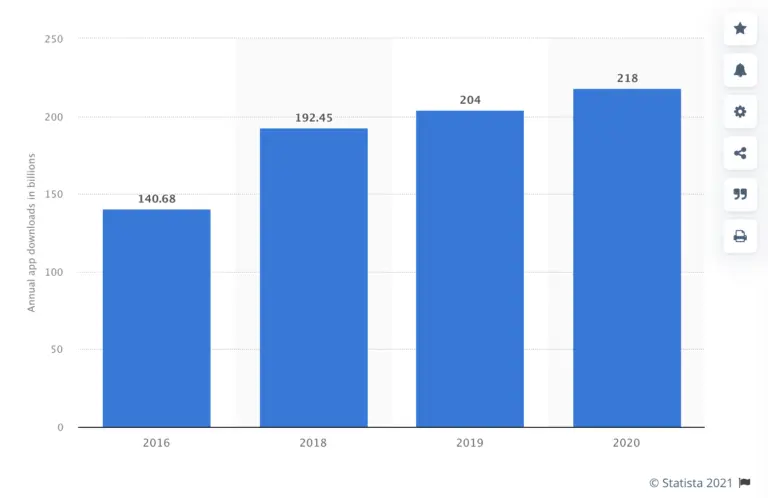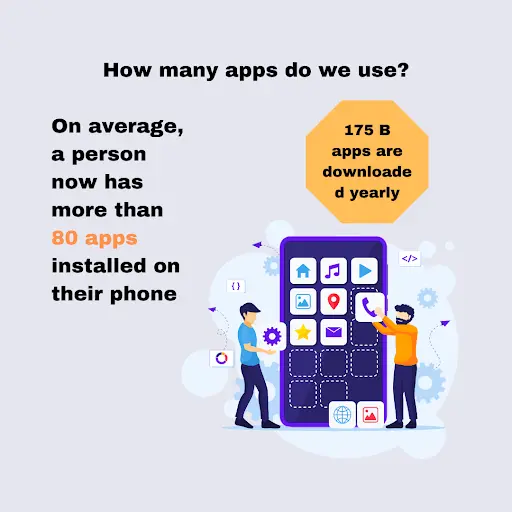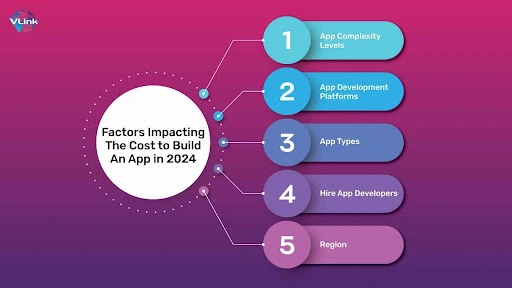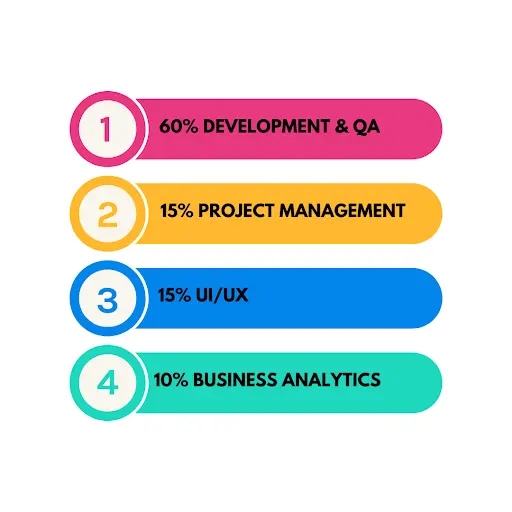- Product development
- 13 May 2024
Mobile App Development: Ready to explore the process? Your complete guide awaits.
Mobile app development

What is mobile app development?
First things first,mobile app development is the process of creating software applications that run on mobile devices like smartphones and tablets.
It’s about crafting experiences that fit right in your pocket, combining coding, design, and testing to bring ideas to life. Whether it’s a fun game, a productivity tool, or a social networking app, mobile app development turns visions into interactive realities on iOS and Android platforms.
 Source: https://buildfire.com/app-statistics/
Source: https://buildfire.com/app-statistics/
Mobile app development lifecycle: process at BEECODED
At BEECODED, we follow the 7 stages of mobile app development: Planning and Requirement Gathering, Design, Development, Testing and Quality Assurance, Deployment, and Maintenance. These stages are designed to navigate through four key phases—Map, Sprint, Release, and Refine—to ensure the success of each project.
Mapping your mobile app’s future
In the mapping stage, we begin by understanding your app’s objectives and the existing technological framework. This critical evaluation helps us plan your mobile app development project with precision, ensuring it aligns with both user expectations and business objectives.
Sprinting towards your goals
Moving into the sprint phase, we collaborate closely with you to plan each step of the app development process. Regular daily check-ins ensure we remain aligned with your vision, addressing any arising issues swiftly to keep the project on track.
Releasing with confidence
Once a sprint is completed, we engage with you to review the progress and move forward to the testing and deployment phases. We approach the release stage with a commitment to quality, conducting extensive testing to ensure the app meets all quality standards and compliance requirements.
Refining post-launch
Post-launch, our involvement doesn’t wane. Our maintenance and security teams remain actively involved, ensuring your mobile app operates smoothly and stays compliant. The mobile app lifecycle doesn’t end at launch; we are dedicated to long-term support, constantly seeking opportunities to enhance and update your app.
Explore our custom SDLC
Interested in learning more about our tailored approach to mobile app development? We invite you to explore our customized Software Development Life Cycle (SDLC).
Mobile application development frameworks
When building mobile apps, developers often use frameworks to simplify the process and speed up development. Here are three popular frameworks for mobile application development:
Flutter app development
Did you know Flutter is a framework developed by Google? It allows developers to create natively compiled applications for mobile, web, and desktop from a single codebase.
Flutter uses the Dart programming language and provides a rich set of pre-designed widgets, making it easy to create visually appealing and responsive apps.
React Native mobile development
One of the best mobile app development software is React Native, created by Facebook, which lets developers build mobile apps using JavaScript and React. With React Native, you can write code once and run it on both iOS and Android. It uses native components, ensuring the app looks and performs like a native one. This framework is popular for its efficiency and strong community support.
Xamarin
Xamarin is a Microsoft-owned framework that uses C# and .NET to create mobile apps. It allows developers to share a significant amount of code across different platforms, reducing development time. Xamarin provides access to native APIs and tools, ensuring high performance and a native look and feel for both iOS and Android apps.
In our blog section, you can explore more interesting details about front-end development frameworks. An FAQs section awaits you, where we’ve answered the most frequently asked questions about mobile app development frameworks.
Types of mobile apps
By understanding the different types of mobile apps, developers can choose the best approach for their projects and create apps that meet the needs and expectations of their users. Here are eight examples of the best mobile app development software.
 Source: https://buildfire.com/app-statistics/
Source: https://buildfire.com/app-statistics/
Native Apps
Native apps are built specifically for a particular operating system (iOS or Android) using platform-specific programming languages (Swift or Objective-C for iOS, and Java or Kotlin for Android). They offer the best performance and user experience since they are optimized for the specific platform.
Web Apps
Web apps are not real applications; they are websites that look and feel like native apps. They run in a web browser and are typically built using HTML, CSS, and JavaScript. Web apps are platform-independent and easier to develop but may not offer the same performance and features as native apps.
Hybrid Apps
Hybrid apps are a blend of native and web apps. They are built using web technologies (HTML, CSS, and JavaScript) but are wrapped in a native container, allowing them to be installed on mobile devices and run through a webview. Frameworks like Ionic and Cordova are often used for developing hybrid apps. They are easier and faster to develop than native apps, but they might not perform as well.
Progressive Web Apps (PWAs)
Progressive Web Apps combine the best of web and mobile apps. They are web apps that use modern web capabilities to deliver an app-like experience. PWAs are fast, reliable, and can work offline. They are discoverable through search engines and can be installed on a user’s home screen without going through an app store.
Gaming Apps
Gaming apps are one of the most popular types of mobile applications. They range from simple puzzle games to complex, high-end graphic games. These apps are usually developed as native apps to take full advantage of the device’s performance capabilities.
Business Apps
Business apps are designed to improve productivity and streamline business processes. Examples include apps for managing tasks, communication tools, and CRM systems. These apps can be native, web-based, or hybrid, depending on the needs of the business.
Lifestyle Apps
Lifestyle apps focus on various aspects of personal lifestyle, such as fitness, dating, music, and travel. These apps help users with daily activities and personal goals, providing tailored content and features to enhance their lifestyle.
Utility Apps
Utility apps perform specific functions that help users with tasks such as managing files, scanning documents, or using a flashlight. These apps are often simple and serve a single purpose effectively.
Mobile apps vs Web apps
When choosing between mobile app development and web app development, it’s important to understand the key differences and advantages of each. Many people likely make mistakes when it comes to differentiating the two aspects, so here we present some important differences to make this subject as clear as possible. We’ll start with the mobile phone application development:
Performance and speed
- Mobile apps are built specifically for a platform (iOS or Android), using native programming languages like Swift, Objective-C, Java, or Kotlin. This allows them to fully utilize the device’s hardware and software capabilities, resulting in superior performance and speed.
User experience
- Mobile apps offer a smoother and more intuitive user experience. They have access to the device’s features, such as the camera, GPS, and push notifications, enabling richer functionality and a more integrated experience.
Offline access
- Once installed, mobile apps can function offline, allowing users to access content and features without an internet connection. This is particularly useful for apps that need to be used on the go, like navigation or gaming apps.
App store presence
- Mobile apps are distributed through app stores (Apple App Store and Google Play Store), providing a platform for discovery and monetization. However, this also means going through a review process and adhering to store guidelines.
Development and maintenance
- Developing mobile apps requires specialized knowledge and separate codebases for iOS and Android, which can be time-consuming and costly. Maintenance and updates also need to be managed for each platform individually.
 Source: https://buildfire.com/app-statistics/
Source: https://buildfire.com/app-statistics/
Web app development:
Accessibility and compatibility
- Web apps run in a web browser and are built using standard web technologies like HTML, CSS, and JavaScript. They are platform-independent and can be accessed from any device with an internet connection, making them highly accessible and compatible.
Ease of development
- Web apps are generally faster and cheaper to develop. A single codebase works across all platforms, reducing development time and costs. Updates and maintenance are also simpler, as changes can be pushed live instantly without needing user intervention.
User experience
- While web apps can be responsive and look good on mobile devices, they may not offer the same level of performance and interactivity as native mobile apps. They have limited access to device features and rely on the browser for functionality.
No installation required
- Users don’t need to download or install web apps, which eliminates barriers to access. They can simply visit a URL to start using the app, making it easier to reach a broader audience.
Offline functionality
- Web apps typically require an internet connection to function, although some advanced web technologies, like Progressive Web Apps (PWAs), can offer limited offline capabilities.
Discoverability
- Web apps can be indexed by search engines, which makes them easier to find through web searches. They don’t rely on app store presence, which can be an advantage in terms of visibility and user acquisition.
How much does mobile app development cost?
The cost of developing a mobile app can vary significantly based on its complexity and the features you intend to include.
For basic functionalities such as a straightforward login and user profile setup, you can expect to pay around €9 to €35 per hour.
However, if you’re aiming for more sophisticated features like in-app purchases, real-time updates, or advanced animations, the hourly rates can start at about €26 and can go much higher depending on the specifics of what you’re looking to build.
 Source: https://www.vlinkinfo.com/blog/what-is-cost-of-building-mobile-app-in-2023/
Source: https://www.vlinkinfo.com/blog/what-is-cost-of-building-mobile-app-in-2023/
Several factors impact the process of mobile app development, each contributing to the overall cost, timeline, and complexity of the project. These factors include:
1. App complexity: the more complex the app, the higher the development cost. Complexity is influenced by the number and sophistication of features, such as user authentication, social media integration, in-app purchases, real-time updates, and animations.
2. Platform choice: developing for iOS, Android, or both can affect the cost and time. Native apps (built specifically for one platform) tend to offer better performance but require separate development efforts for each platform, whereas cross-platform apps can be more cost-effective but might have performance trade-offs.
3. Design and user experience: a well-designed app with an intuitive user interface and seamless user experience requires more effort and expertise in UI/UX design. Custom graphics, animations, and interactive elements can increase development time and costs.
4. Backend infrastructure: apps requiring robust backend support, such as cloud storage, database management, server maintenance, and API integrations, will have higher development costs. The complexity of the backend infrastructure directly influences the app’s scalability and performance.
5. Third-party integrations: incorporating third-party services and APIs, such as payment gateways, social media platforms, or geolocation services, can add to the development complexity and cost.
6. Testing and maintenance: rigorous testing for different devices, operating systems, and scenarios is crucial for a smooth user experience. Post-launch maintenance, including updates, bug fixes, and feature enhancements, also adds to the ongoing costs.
7. Developer expertise and location: the experience and skill level of the development team, as well as their geographical location, significantly affect the hourly rates. Developers in regions with higher living costs typically charge more for their services.
Mobile app development for Android and iOS
Now, let’s talk about platforms. Are you team iOS, team Android, or both? Choosing between Android and iOS platforms can also impact your development costs.
If you opt to develop your app for a single platform, either Android or iOS, the cost typically ranges from €9 to €17 per hour.
However, if you decide to target both platforms from the start, perhaps using cross-platform technologies like React Native or Flutter, the hourly rates can range from €35 to €176.
This broader range often reflects the additional complexity and expertise required to ensure seamless functionality across different operating systems.
 Source: https://www.vlinkinfo.com/blog/what-is-cost-of-building-mobile-app-in-2023/
Source: https://www.vlinkinfo.com/blog/what-is-cost-of-building-mobile-app-in-2023/
Here’s the thing: where you’re building matters too. Developers in North America and Western Europe typically charge more per hour than their counterparts in Eastern Europe or Asia. But hey, quality and communication count, so it’s not just about the price tag.
Oh, and let’s not forget about the ongoing stuff. Maintenance, updates, marketing—you’ve got to budget for those too. Plan on setting aside 15-20% of your initial development costs for yearly maintenance.
So there you have it—your guide to mobile app development costs. Remember, it’s not just about the numbers; it’s about bringing your idea to life in the best way possible.
FAQs about mobile app development
Our favorite part is discovering the curiosities of our colleagues or future colleagues in the software field, so we took a look at the questions they ask about mobile phone application development. We’ve selected a few, eager to clarify some aspects.
- What are the limitations of a web application?
The limitations of web applications include limited access to device features, reliance on internet connectivity, performance issues compared to native apps, and potential security vulnerabilities.
- How long does it take to develop an app?
The time it takes to develop an app varies depending on factors like complexity, features, platform, and team size. Simple apps may take a few months, while complex ones can take a year or more.
- Are mobile apps better than websites?
Mobile apps and websites serve different purposes and have distinct advantages. Mobile apps offer better performance, access to device features, and offline functionality, making them preferable for certain tasks. However, websites are accessible across all devices, easier to update, and require no installation, making them better for certain types of content and interactions. Ultimately, it depends on the specific needs and goals of the project.
- Mobile App Development: React Native or Flutter?
Choosing between React Native and Flutter for mobile app development depends on your specific needs: React Native (best for leveraging JavaScript expertise, having a large community, and requiring native-like performance with a smoother learning curve for web developers) and Flutter which is ideal for high-performance apps with complex UI designs, offering a rich set of pre-designed widgets, and benefiting from Dart’s strong typing and Google’s backing. Both frameworks are excellent for cross-platform development, but your choice should align with your team’s skills and the project requirements.
- Why are native applications faster?
Native applications are faster because they are optimized for their specific platform, providing direct access to platform APIs and hardware, and are compiled into machine code specific to the device’s processor, ensuring efficient execution and better overall performance.
Why develop a mobile app with BEECODED
Developing your mobile app with BEECODED means accessing a streamlined, comprehensive approach that guarantees success. From meticulously understanding your project goals to agile collaboration throughout development, we ensure your app meets user needs and business objectives seamlessly.
Our rigorous testing and release management protocols guarantee a high-quality, secure product launch, with ongoing refinement and support to keep your app ahead of the curve. With BEECODED, you’ll benefit from expert guidance and a tailored approach that turns your app vision into a market-leading reality.
Latest blog posts
View all postsSaaS development vs. traditional software development: Key Differences

Diana
22 August 2024Digital product discovery process for product owners [Guide]

Diana
14 August 2024